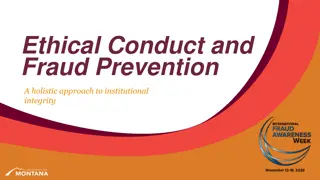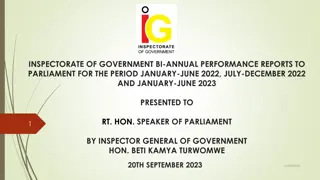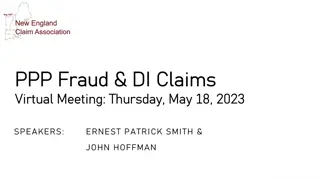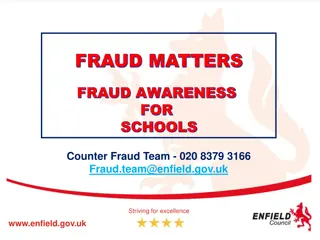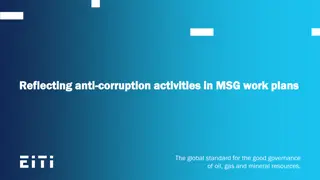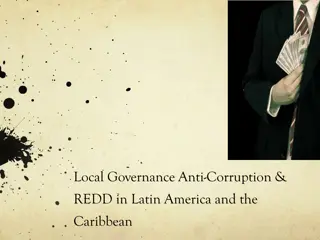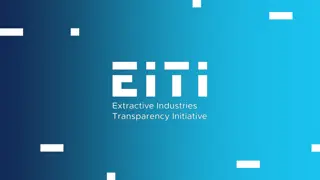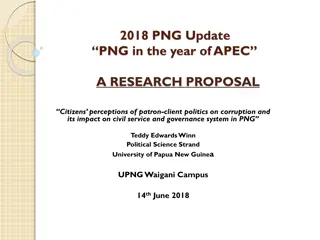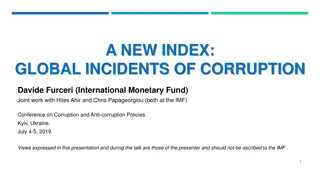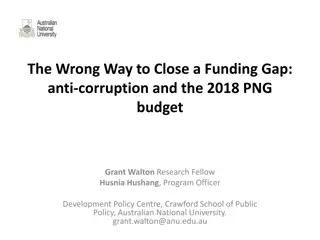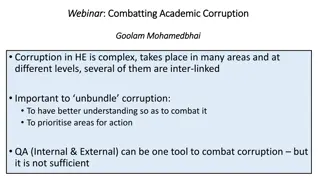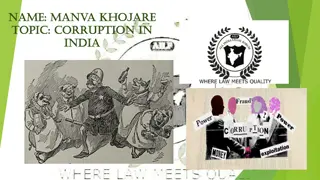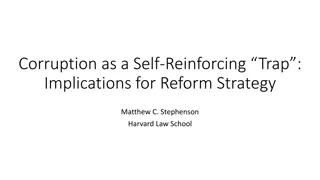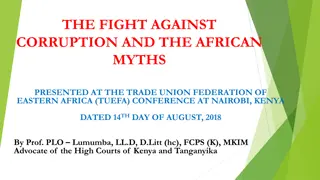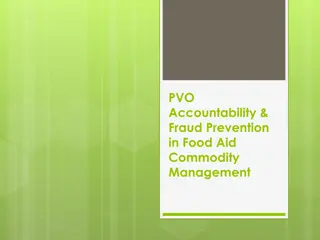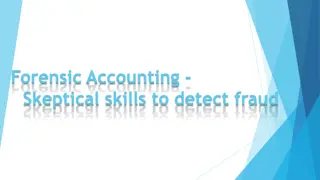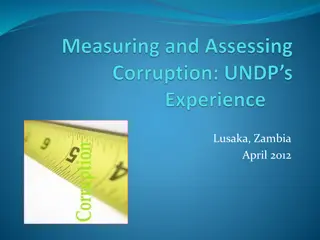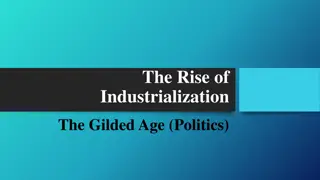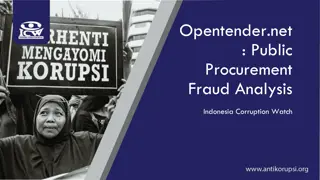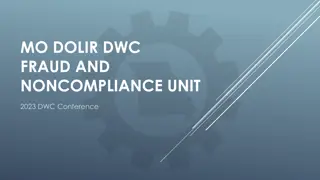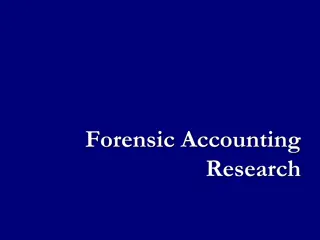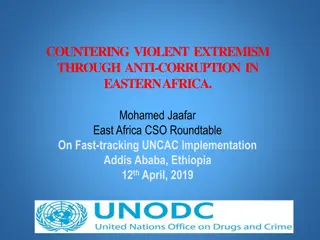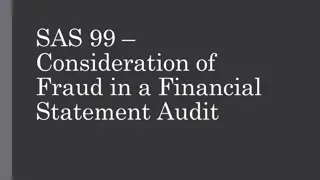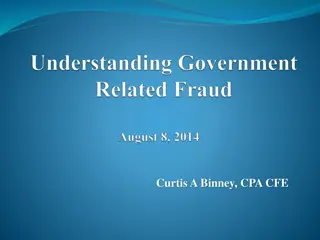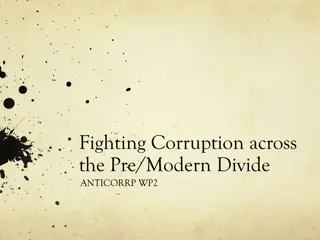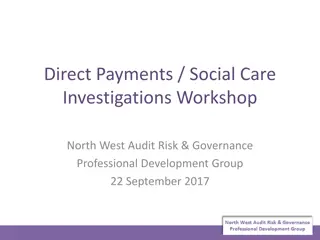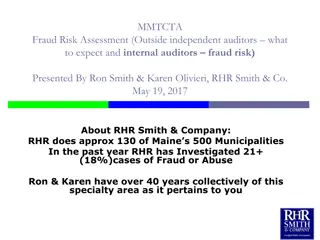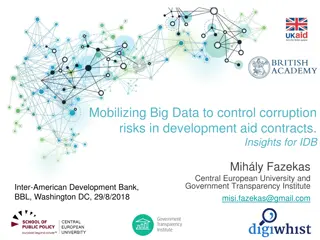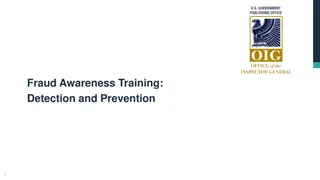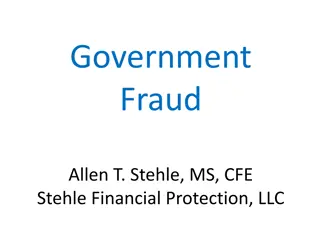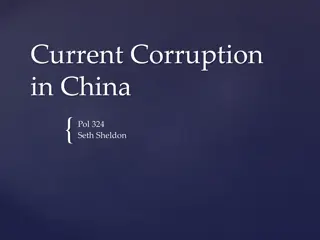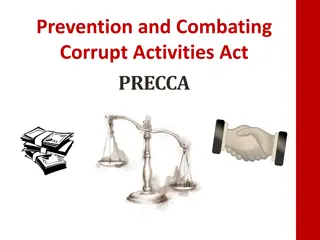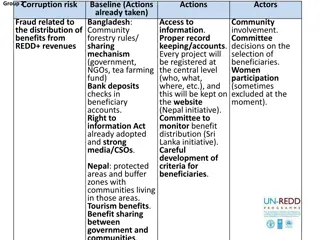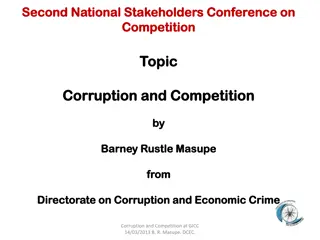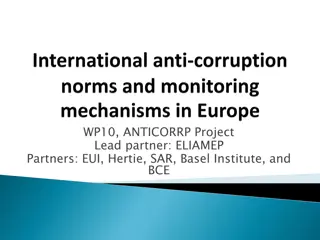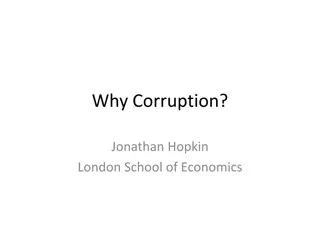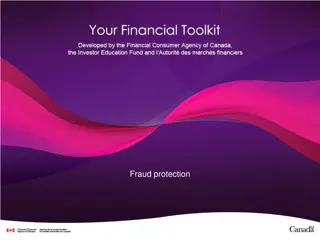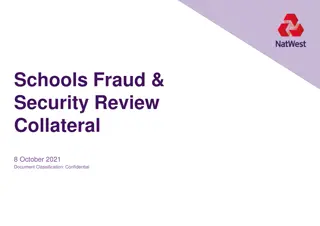Efficient Fraud Management with Data Analytics
Learn the importance of data analytics in fraud management and how it can streamline risk assessment, prevention, detection, audit planning, and investigation processes. Discover key areas where data analytics can make a difference and avoid common mistakes in your fraud analytics plan. Embrace data
2 views • 33 slides
Understanding Ethical Conduct and Fraud Prevention in Institutions
Explore the nuances between ethics and fraud, famous fraud cases like Enron and Bernard L. Madoff Investment Securities LLC, and learn how to detect and prevent fraudulent activities within institutions. Recognize the importance of ethical behavior, early detection, and fraud prevention measures to
9 views • 36 slides
Inspectorate of Government Bi-Annual Performance Reports and Anti-Corruption Function Summary
The Inspectorate of Government in Uganda, led by the Inspector General Beti Kamya Turwomwe, presented bi-annual performance reports to Parliament for the periods January-June 2022, July-December 2022, and January-June 2023. The reports highlight the IG's mandate derived from the Constitution, focusi
1 views • 16 slides
Understanding Fraud in Financial Claims: Insights from Experts
Delve into the world of fraud and insurance claims with insights from renowned experts Ernest Patrick Smith and John Hoffman. Learn about the key elements of fraud, common definitions, and the intricacies of proving fraud, particularly in the challenging landscape of the California Department of Ins
0 views • 29 slides
Enhancing Fraud Awareness in Schools
Fraud Matters is a comprehensive program focused on increasing fraud awareness in schools. The initiative aims to educate staff, students, and stakeholders about the risks of fraud, preventive measures, and the detrimental impacts of fraudulent activities. By understanding what constitutes fraud and
1 views • 38 slides
Enhancing Anti-Corruption Activities in Extractive Sector Work Plans
Reflecting on anti-corruption activities in MSG work plans is crucial for good governance of oil, gas, and mineral resources. The EITI provides guidance on addressing corruption risks, with a recommended three-step approach: assess risks, develop an activity plan, and monitor results. Step 1 involve
0 views • 11 slides
Corruption and Anti-Corruption Measures in Latin America and the Caribbean
This research delves into the issue of corruption at the sub-national level in Latin America and the Caribbean, particularly focusing on the forest sector and the REDD+ program. It examines the vulnerable areas, corrupt practices, and lessons learned from case studies in Brazil and Bolivia. The stud
0 views • 28 slides
Role of EITI in Addressing Corruption in Extractive Sectors
The Extractive Industries Transparency Initiative (EITI) plays a crucial role in combating corruption in the oil, gas, and mineral sectors globally. By exposing vulnerable practices, providing contextual information, supporting citizen engagement, and advancing anti-corruption norms, EITI helps dete
0 views • 9 slides
Perceptions of Patron-Client Politics on Corruption in Papua New Guinea: A Research Proposal
Investigate the impact of patron-client politics on corruption in PNG to understand its effects on civil service and governance. Analyze traditional and modern systems to identify prevailing patronage types and their influence on corruption. The study aims to redefine corruption in the PNG context f
0 views • 24 slides
Global Incidents of Corruption: A New Index by Davide Furceri
Davide Furceri from the International Monetary Fund discusses the need for a new index of corruption, construction methodology, impact on the economy, and progress in measuring corruption. The presentation emphasizes the IMF's active role in combating corruption worldwide.
3 views • 32 slides
Analysis of Anti-corruption Funding Discrepancies in the 2018 PNG Budget
The study examines the funding allocation and actual spending for anti-corruption organizations in the 2018 budget of Papua New Guinea, highlighting decreases in funding for crucial entities like FIU/FASU, Fraud Squad, ICAC, and Auditor General over the years, raising concerns about the government's
0 views • 24 slides
Strategies for Combating Academic Corruption in Higher Education
Corruption in higher education is a multifaceted issue that requires unbundling to effectively combat. Strategies include creating awareness, sharing resources, focusing on prevention over punishment, and implementing internal quality assurance systems. Actions within and outside higher education in
0 views • 6 slides
Understanding Corruption in India: Causes, Effects, and Solutions
Corruption in India is a significant issue affecting the economy and society at large. This article explores the definition of corruption, its prevalence in India, key causes, major players involved, comparison with global standings, and methods employed. Lack of effective management, inadequate ove
1 views • 18 slides
Unpacking Self-Reinforcing Corruption Patterns
Delve into the complex dynamics of self-reinforcing corruption cycles and their implications for reform strategies. Explore how widespread corruption weakens deterrence, strengthens individual incentives for corruption, and impacts social norms against corrupt practices.
0 views • 45 slides
The Fight Against Corruption and African Myths in Review at TUEFA Conference
Prof. PLO Lumumba delivered a compelling speech addressing corruption and African myths at the TUEFA Conference in Nairobi. The presentation highlighted the cultural and colloquial definitions of corruption, emphasizing its widespread impact in Africa. The origins and causes of corruption in Africa
0 views • 23 slides
Corruption and Accountability in Food Aid Management
Corruption in humanitarian aid, particularly in the management of food aid commodities, deprives the most vulnerable of essential resources, hindering the noble goal of saving lives during crises. Examples from the Liberia-Sierra Leone refugee crisis shed light on the rampant corruption, where benef
0 views • 16 slides
Understanding Fraud and Forensic Accounting
Fraud is defined as deception to gain an unlawful advantage. Various legal definitions of fraud under Indian law are discussed, including those under the Indian Penal Code, Indian Contract Act, and Companies Act. The concept of forensic accounting in detecting and investigating fraud is also introdu
0 views • 15 slides
Challenges in Measuring Corruption: Tools, Methodologies, and Solutions
The dilemma of measuring corruption lies in the diverse definitions, perceptions, and manifestations across societies. This article discusses the value of measuring corruption, the existing tools and methodologies, their limitations, and the need for more customized and credible indicators. It also
0 views • 11 slides
Challenges of Democracy and Corruption in the Gilded Age
The Gilded Age (1877-1900) was a time of political inaction and widespread corruption, raising doubts about the endurance of democracy in the face of powerful corporations and wealthy individuals. The era saw a balance of power with partisan divides making lawmaking difficult. Presidents like Ruther
0 views • 11 slides
Unveiling Public Procurement Corruption Trends in Indonesia
Public procurement in Indonesia faces significant corruption risks, with a substantial portion of the state budget allocated to the sector. Opentender.net provides valuable insights into fraud analysis and trends, highlighting the importance of monitoring and improving the procurement process to bri
0 views • 19 slides
Missouri Department of Labor and Industrial Relations (DOLIR) Fraud and Noncompliance Unit Overview
The Missouri DOLIR Fraud and Noncompliance Unit (FNU) was established in 1993 by the General Assembly to investigate fraud and noncompliance related to Chapter 287 RSMo (Workers' Compensation Law). The FNU is dedicated to promoting a safe work environment by upholding the integrity of Missouri's Wor
0 views • 35 slides
Understanding Forensic Accounting and Fraud - Types and Definitions
Forensic accounting plays a crucial role in detecting and investigating various types of fraud such as financial reporting fraud, asset misappropriation, and employee embezzlement. Fraud is defined as intentional deception resulting in a loss and involves misrepresentation of material facts. Types o
0 views • 19 slides
Countering Violent Extremism Through Anti-Corruption in Eastern Africa
The project aims to pilot the impact of countering police corruption on radicalization and acts of violent extremism in Eastern Africa. By increasing internal anti-corruption oversight, empowering communities to report corruption effectively, and promoting collaboration between community, police, an
0 views • 17 slides
Understanding SAS 99 and Fraud Consideration in Financial Audits
This presentation delves into SAS 99, highlighting the importance of considering fraud in financial statement audits. It explains the impact of SAS 99 on auditors, emphasizes management's role in preventing and detecting fraud, and discusses the Fraud Triangle and types of fraud addressed by SAS 99.
1 views • 41 slides
Understanding Fraud in Auditing and Government
Fraud encompasses multifarious means of deception for personal gain and can significantly impact financial statements. Government fraud involves intentional acts to deceive, resulting in substantial losses annually. Auditors must diligently identify and address fraud risks to ensure the accuracy and
3 views • 68 slides
Uncovering Corruption: Bridging the Pre/Modern Gap
Exploring the history of corruption across different eras, a research project delves into premodern and modern societies to understand the factors influencing corruption and strategies to combat it. Through workshops, presentations, and publications, the project aims to redefine success in governanc
0 views • 6 slides
Direct Payments & Social Care Investigations Workshop Overview
Explore the key areas covered in the Direct Payments & Social Care Investigations Workshop, focusing on Direct Payments, social care fraud, applications, counter-fraud work, investigations, and overcoming cultural resistance. Delve into the risks associated with social care fraud and learn about the
0 views • 28 slides
Understanding Corruption, Governance, and Societal Norms
Alina Mungiu-Pippidi delves into the complexities of corruption, governance regimes, and societal norms, emphasizing the need to transform governance systems rather than just combat illegal corruption. She explores the concepts of corruption at the individual and societal levels, governance regimes,
0 views • 30 slides
Fraud Risk Assessment and Internal Controls Overview
This presentation by Ron Smith & Karen Olivieri from RHR Smith & Co discusses fraud risk assessment, the definition of fraud, types of fraud, fraudster statistics, and the importance of internal controls in preventing and detecting fraud. They also delve into the responsibilities of auditors in prov
0 views • 42 slides
Leveraging Big Data for Monitoring Corruption Risks in Development Aid Contracts
Explore insights on utilizing big data to enhance oversight and control corruption risks in development aid contracts, focusing on innovations in corruption measurement, data mobilization for development, and widening access to combat corruption. Understand corruption proxies, underlying data, and c
0 views • 47 slides
Fraud Awareness Training: Detection and Prevention
This comprehensive fraud awareness training covers the detection and prevention of fraud, including an overview of the Office of Inspector General, common types of fraud, red flags for detection, examples of cases, fraud prevention strategies, and reporting mechanisms. It delves into the elements of
0 views • 20 slides
Understanding Government Fraud: Impacts and Prevention
Government fraud is a serious issue that impacts public trust and financial stability. This type of fraud involves intentional acts to deceive the government and can occur internally or externally. The public perception of government organizations is affected by fraud, and entities such as the U.S.
1 views • 50 slides
Understanding Corruption in China: Insights and Reforms
The state-controlled nature of many prominent businesses in China, mixed with instances of corruption and inefficiency at various levels, highlights challenges faced by the government and public discontent. Economist Adam Hersh suggests a complex relationship between government-owned and privately o
0 views • 10 slides
Understanding the Prevention and Combating of Corrupt Activities Act (PRECCA)
The Prevention and Combating of Corrupt Activities Act (PRECCA) aims to prevent and combat corruption in both government and the private sector. It establishes measures to prevent corruption, defines various corrupt activities, and imposes obligations on individuals and entities to report corruption
0 views • 15 slides
Corruption Risk Mitigation Strategies in Forest Management Projects
Various corruption risk mitigation actions have been implemented in forest management projects in Bangladesh, Nepal, and Sri Lanka. These actions include community involvement, transparency mechanisms, stakeholder engagement, and legal awareness programs to prevent fraud and elite capture. Strategie
0 views • 5 slides
Understanding Corruption and Competition in Botswana: Insights from Barney Rustle Masupe
Directorate on Corruption and Economic Crime (DCEC) in Botswana tackles corruption through investigation, prevention, and education. Corruption is defined as the misuse of public office for personal gain. Corrupt activities include soliciting, offering, or receiving valuable consideration. Barney Ru
0 views • 19 slides
International Anti-Corruption Frameworks and State Compliance
Scholarship on state compliance with international law and the impact of anti-corruption standards on domestic policies is growing, yet there is a lack of systematic studies on how states comply with and implement these standards. Various organizations and conventions focus on combating corruption a
0 views • 10 slides
Understanding Corruption and Its Implications on Institutions and Society
Corruption, as discussed by Jonathan Hopkin from the London School of Economics, is viewed through various lenses - from a reflection of traditional hierarchical ties in modernization theory to the inadequacy of political institutions. Economists highlight how corruption distorts market allocation.
0 views • 8 slides
Fraud Protection and Awareness Workshop
Join us for a comprehensive workshop on fraud protection and awareness. Learn about common fraud schemes, how to identify warning signs, protect your finances, and what to do if you fall victim to fraud. Engage in interactive quizzes to test your knowledge and stay informed. Let's work together to p
0 views • 26 slides
Schools Fraud & Security Review Collateral
This document titled "Schools Fraud & Security Review Collateral" discusses various aspects of fraud and security including the latest trends, information on suspicious activities like email scams and investment offers, and provides further help and guidance. It emphasizes the need for vigilance and
0 views • 9 slides

